This chapter contains a little number of movies, but it is quite understandable. The dramas that were filmed during the communistic era mostly had a propaganda purpose and their quality was not too high. From the good ones, almost all concern the time of the World War II or the post-war era. The most known of them is undoubtedly Menzel's Ostře sledované vlaky (The Closely Watched Trains, 1966), but I personally see nothing spectacular on it and I don't understand, why just this title got an Oscar (until now it allegedly runs on American TV's almost every year). My favourite is rather Krejčík's Vyšší princip (The Higher Principle, 1960), because it feazes me most of all the titles below (which a good drama should do). For foreigners perhaps the most interesting title is Sequens' Atentát (The Assassination, 1964) that depicts the assassination of Reinhard Heydrich in 1942 and is a more realistic version of British Operation Daybreak (1974). Further there is an international coproduction about the assassination of Ferdinand d'Este in 1914 (Sarajevský atentát/The Assassination In Sarajevo, 1975). A very good title that is really worth watching is also Jasný's critical view of the post-war era Všichni dobří rodáci (All Good Natives, 1968). From the recent years I would stress Mináč's Všichni moji blízcí (All My Loved Ones), which is a very strong drama from the beginning of the WW II. I think that I should add even some other, more "art-like" movies (e.g. Spalovač mrtvol/The Cremator, 1968), but hopefully in the near future.
15 movies are included (more will be added later)
Bílá nemoc (1937)
Direction: Hugo Haas. Screenplay: Hugo Haas after a theatre play of Karel Čapek. Music: Jan Branberger. Starring: Hugo Haas (dr Galén), Bedřich Karen (profesor Sigelius), Zdeněk Štěpánek (the marshall), Václav Vydra sen. (baron Krog), Ladislav Boháč (his son), Karla Oličová (marshall's daughter), František Smolík (father), Helena Frýdlová (mother), Vítězslav Boček (son), Jaroslav Průcha (dr Martin).
A totalitarian state ruled by an aggressive marshal suffers from a lethal epidemy. Dr Galén is the only man in the country, who knows an effective medicine, and he uses it mainly for poor people. While the epidemy endangers more and more people, the marshall is planning a military attack against a neighbouring country. Yet the disease soon afflicts himself and he asks Galén for help. Galén promises his medicine upon the condition that the marshall will give up his military plans. But during the way to the marshall's palace he is beaten to death by fanatic soldiers.
A rare dramatic role for Hugo Haas, who also led the direction and wrote the screenplay. In the dark atmosphere preceding the Nazi occupation of Czechoslovakia, this adaptation of famous Čapek's novel had a clear symbolic sense. The lethal disease was a metaphora of the Hitler's Nazi regime that spread across Europe like a dangerous epidemy.
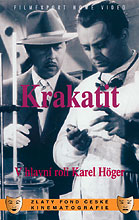 Krakatit (1948)
Krakatit (1948)
Direction: Otakar Vávra. Screenplay: Otakar Vávra, Jaroslav Vávra after a novel of Karel Čapek. Music: Jiří Srnka. Starring: Karel Höger (ing. Prokop), Florence Marly (the princess), František Smolík (dr. Tomeš), Eduard Linkers (Carson), Jiří Plachý (d'Hémon), Miroslav Homola (Jirka Tomeš), Bedřich Vrbský (Rohn), Vlasta Fabianová (the girl with a veil).
A gloomy drama based on a novel of Karel Čapek that bears the same name. Engineer Prokop has invented a weapon of mass destruction that he calls "krakatit". Subsequently he is tempted by a group of warmongers, who want to know the secret of the weapon's production. Prokop hesitates, because he realizes that it could mean a disaster for the whole world. Therefore they hire Prokop's collaborator Tomeš, who is willing to reveal it, and make him a chief of their pernicious war project. However, the production of the weapon will get out of their hands and will cause their end.
Director Vávra made one of his best movies. Especially the second half is almost ghastly and evokes a depressed atmosphere. More than 30 years ago (1980) he made an "updated" remake of the same title called Temné slunce (The Dark Sun) that was richly sponsored by the communistic regime. Here the warmongers strikingly resembled a secret service of some hostile Western country and the krakatit was a clear substitution for a nuclear bomb. Again it contains a gloomy, paranoic atmosphere of omnipresent danger. I remember that when I have seen it as a child, I couldn't then fall asleep, but I haven't seen it on TV for a long time, so I can't judge its real quality. I can only list an opinion of one critic, who called it an "artistic failure". It is hardly probable that this movie will run on TV in the near future, because it belongs to the "Golden Fund" of the communistic propaganda.
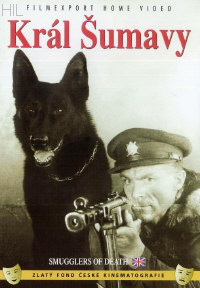 Král
Šumavy (1959)
Král
Šumavy (1959)
(The King of Šumava)
Direction: Karel Kachyňa. Screenplay: František A. Dvořák, Karel Kachyňa. Music: Miloš Vacek. Starring: Jiří Vala (sergeant Karel Zeman), Radovan Lukavský (lieutenant Václav Kot), Jiřina Švorcová (Marie Rysová), Jaroslav Marvan (Beran), Stanislav Remunda (Pavel Rys), Miloslav Holub (the forester), Jiří Holý (Galapetr), Vladimír Menšík (Burdyška), Ilja Prachař (the district chief of the Security).
The Czechoslovak-German border in Šumava (Böhmerwald), summer 1948: The marshy region in the mountains is a place, where many people flee from the country after the communistic putsch in February 1948. But the way through the marshes is known only to few people and one of them is the "King of Šumava", a nightmare of border guards. However, sergeant Zeman, who comes to that place, decides to catch him and reveal his mysterious identity.
Although politically angled, The King of Šumava is still a very popular movie based on a true story. The reason of its popularity results from its exceptionally suggestive, captivating atmosphere in the foggy marshes.
|
|
| Ivan Mistrík, a Slovak actor, as Vlastík, and Jana Brejchová as Jana. |
Vyšší princip (1960)
(Higher Principle)
Direction: Jiří Krejčík. Screenplay: Jan Drda. Collaboration: Jiří Krejčík. Music: Zdeněk Liška. Starring: František Smolík (professor Málek/Higher Principle), Jana Brejchová (Jana Skálová), Ivan Mistrík (Vlastík Ryšánek), Jan Šmíd (František), Alexander Postler (Karel), Petr Kostka (Honza), Radovan Lukavský, Gustav Hilmar, Václav Lohniský (professors), Bohuš Záhorský (the director), Marie Vášová (Mrs. Ryšánek), Otomar Krejča (Skála), Hannjo Hasse (the commissioner).
June 1942, the time after the assassination of Reinhard Heydrich: Schoolmates from a high school in one Czech town prepare for a leaving exam and three of them make a joke on Heydrich's account. However, one of their schoolmates informs the gestapo about it and they are arrested just during the leaving exam. In the tense atmosphere that follows - because nobody knows the reason of the arrest - one girl of the class decides to push her father, a respected lawyer, who has friendly relationship with the chief of the gestapo, to find out something about it and accomplish their liberation. Nevertheless, he is afraid and the only man, who dares to do it, is an old professor of Latin nicknamed "Higher Principle" after his frequently proclaimed moral principles. But "Higher Principle" is deceived and the boys are executed...
An outstanding drama based on true events that happened in one Czech town after Heydrich's death. The atmosphere of omnipresent fear makes me gooseflesh everytime I am watching it and gets my blood cold. I don't know many so impressive and authentic movies of this sort.
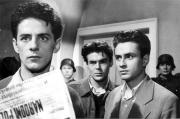
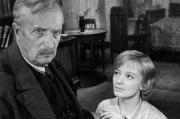
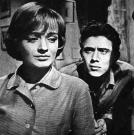
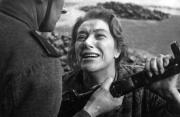
Atentát (1964)
(The Assassination)
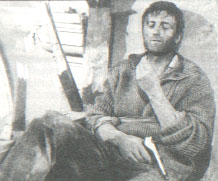 |
|
Radoslav Brzobohatý as lieutenant Král-Opálka during the fight in the chapel. Soon he will have only the last bullet that he will let for himself. |
Direction: Jiří Sequens. Screenplay: Miloslav Fábera, Kamil Pixa, Jiří Sequens. Starring: Radoslav Brzobohatý (lieutenant Král), Luděk Munzar (lieutenant Sedlák), Ladislav Mrkvička (srg. Vyskočil), Rudolf Jelínek (srg. Strnad), Jiří Kodet (srg. Toušek), Josef Vinklář (srg. Vrbas), Vladimír Hlavatý and Vlasta Matulová (the Otradovecs), Jiří Holý (Pavelka), Petr Oliva (Péťa), Siegfried Loyda (Heydrich), Harry Studt (Canaris).
A movie depicting the assassination of Reinhard Heydrich in May 1942. We start in England, where the paratroopers are trained and gradually we get to Prague, where the assassination took place. Then the paratroopers are hidden in the crypt of the Karel Bartolomějský's chapel in Prague. On June 18th members of the Czech resistance plan to use a funeral car and get them out of the city in coffins. The men doesn't know that they will really end in coffins, because one of their colleagues didn't stand the atmosphere of fear and betrayed them. The final scenes depict the unequal fight in the crypt and their death.
The movie is rated quite high from the view of historians, although not everything is perfect. However, the majority of errors are rather details. There are only two things that I don't understand: Why do the paratroopers figure under their false protectorate names and not their true ones (Vyskočil = Gabčík, Strnad = Kubiš, Král = Opálka, Vrbas = Čurda etc.)? The same holds for the members of the Czech resistance. And why does Ladislav Mrkvička (as Vyskočil-Gabčík) speaks once Czech and elsewhere Slovak (Gabčík was a Slovak soldier)? By the way, I have a personal relationship to this movie, because one of those seven heroes, their commander Opálka, was born in my native village.
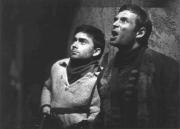
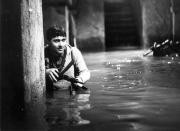
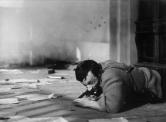
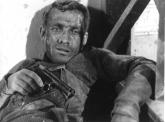
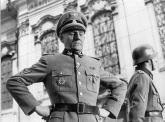
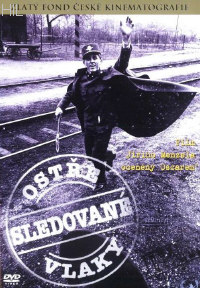 Ostře sledované vlaky (1966)
Ostře sledované vlaky (1966)
(Closely Watched Trains)
Direction: Jiří Menzel. Screenplay: Bohumil Hrabal after his own novel, Jiří Menzel. Music: Jiří Šust. Starring: Václav Neckář (Miloš Hrma), Jitka Bendová (Máša), Josef Somr (Hubička), Vladimír Valenta (the station master), Libuše Havelková (his wife), Vlastimil Brodský (Zednicek), Naďa Urbánková (Viktoria Freie), Jiří Menzel (dr. Brabec), Květa Fialová (the countess).
A railway station during the WW II: young dispatcher Miloš has sexual problems with precocious ejaculation and solves this problem in the collaboration with his older colleague Hubička, who is an irredeemable tempter of women. When it seems that Miloš' problems are gone, he is entrusted by Hubička to make a sabotage on one of the "closely watched" Nazi trains that passes through the station. Miloš' attempt is successful, but subsequently is killed by a German soldier.
A movie that won OSCAR in 1967 and started a very fertile film career of the director Jiří Menzel. Václav Neckář in the role of young Miloš was also very convincing. However, this movie doesn't belong to my favourite ones. I can't help myself, but I simply don't understand it and I have never found anything exceptional on it. Contrary to it, the IMDb database lists over 1000 votes of this movie, including more than 300 US-users.
Všichni dobří rodáci (1968)
(All Good Natives)
Direction: Vojtěch Jasný. Screenplay: Vojtěch Jasný. Music: Svatopluk Havelka. Starring: Vlastimil Brodský (Očenáš), Radoslav Brzobohatý (František), Věra Galatíková (his wife), Vladimír Menšík (Pyřk), Waldemar Matuška (Zášínek), Drahomíra Hofmanová (the Happy Widow), Pavel Pavlovský (Bertin), Václav Babka (Franta Lampa), Josef Hlinomaz (Frajzl), Karel Augusta (Joža Trňa), Ilja Prachař (Plécmera), Václav Lohniský (Zejvala).
A chronicle of a Moravian village during hard times after the WW II (1945-1958) inspired by real stories from the native region of the director. Gradually we watch dramatic fates of seven friends: Jořka Pyřk dies, when he incurs a wounding to avoid service in the army; young housekeeper František becomes a victim of the communistic regime, because he doesn't want to give up his estate; Zášínek is killed by his ox; Father Očenáš is to be murdered and showed as a Western spy, but he is busy and a young postman, whom he sends to the place of the encounter, is killed instead of him. In the meantime, the biggest loafers and wrongdoers enter the communistic party and get the power over the town...
All Good Natives belong to the best Czech dramas. In a film inquiry made among Czech film critics it ended in the 2nd place behind Markéta Lazarova. This time I agree with such an opinion, because it is really a very suggestive and impressive work.
Skřivánci na niti (1969)
(Larks on the Thread)
Direction: Jiří Menzel. Screenplay: Jiří Menzel and Bohumil Hrabal. Based on stories of Bohumil Hrabal. Music: Jiří Šust. Starring: Rudolf Hrušínský II. (the trustee), Václav Neckář (Pavel Hvězdář), Jitka Zelenohorská (Jitka), Vladimír Ptáček (Mlíkař), Naďa Urbánková (Lenka), Vlastimil Brodský (the professor), Ferdinand Krůta (Kudla), František Řehák (Drobeček), Leoš Suchařípa (the prosecutor), Jaroslav Satoranský (Anděl), Vladimír Šmeral (minister Nejedlý), Zdeněk Svěrák (the delegate).
A bitter comedy from a "reeducation" working camp of the 50's, where the communistic regime collected incommodious intellectuals, traders and those, who had unsuccessfully tried to escape to the West. This movie was banned for 20 years and its premiere took place as late as in 1990. In the same year it was presented at the film festival in Berlin. The last important role of Václav Neckář.
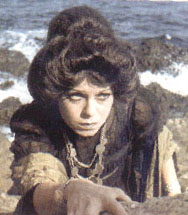 Morgiana (1972)
Morgiana (1972)
Direction: Juraj Herz. Screenplay: Vladimír Bor after a novel of Alexandr Grin Jessie a Morgiana. Music: Luboš Fišer. Starring: Iva Janžurová (Klára/Viktorie), Josef Abrhám (Marek), Nina Divíšková (Otýlie), Petr Čepek (Glenar), Josef Somr (the drunker), Jiří Kodet (Bessant), Jiří Lír (the officer), Karel Augusta (dr. Mayer), Zuzana Fišárková (Mercedes), Marie Drahokoupilová (Alžběta).
A story set on the Dalmatian coast sometimes around 1900: ugly Viktorie envies her beautiful sister Klára. She obtains a poison from Alžběta, an experienced expert in drugs, and plans to gradually kill Klára using little doses of the poison so that it wouldn't be suspicious to anybody. After several days Klára feels ill and Viktorie is happy that her plan succeeded. But she must also remove Alžběta as the only witness of her crime. Yet eventually the story will end for her tragically.
A double role for Iva Janžurová, who performed both sisters (ugly/sabled Viktorie + beautiful Klára dressed in white). I like this movie very much. It has a very gloomy atmosphere augmented by good camera. Morgiana is a name of Viktorie's cat.
Sarajevský atentát (1975)
(The Assassination in Sarajevo)
Direction: Veljko Bulajić. Screenplay: Stevan Bulajić, Vladimír Bor. Music: Libor Fišer. Starring: Christopher Plummer (the archduke - speaks František Němec), Florinda Bolkan (Žofie, his wife - speaks Klára Jerneková), Maximilian Schell (Šarac - speaks František Vicena), Irfan Mensur (Princip - speaks Petr Štěpánek), Radoš M. Bajić (Nedjelko - speaks Alfréd Strejček), Jan Hrušínský (Trifko), Branko Durić (Ilić - speaks Miroslav Moravec), Libuše Šafránková (Jelena), Ivan Vyskočil (Mehmed), Charles Millot (the investigator), Otomar Korbelář (the emperor), Jana Švandová (Mici), Hanjo Hasse (Wilhelm II).
A movie depicting another assassination tied with Czech history, this time the assassination in Sarajevo, where in 1914 Ferdinand d'Este, the Austrian archduke and successor of the throne, was killed together with his wife, Czech countess Žofie Chotková. The story begins with scenes from Ferdinand's stay at his favourite residence, the Konopiště castle, his conflicts with the emperor and the preparations of Serbian assassins. The movie psychologically studies their motives and considerations concerning possible consequences of the assassination.
As the casting suggests, it was an expensive international coproduction with famous stars. In my opinion, it is a good title with impressive music (I don't know, who composed the title melody, but it is some classical composition that quite often appears in movies). But I have read that it is not rated too high by film critics. The role of the emperor was the last film part of Otomar Korbelář, once a big star of the First Republic cinema.
Stíny horkého léta (1977)
(Shadows of Hot Summer)
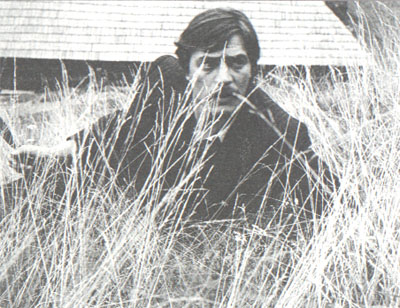 Direction:
František Vláčil. Screenplay: Jiří Křižan. Music: Zdeněk Liška. Starring:
Juraj Kukura (Ondřej Beran), Marta Vančurová (Tereza, his wife), Robert Lischke
(Lukáš, his son), Gustáv Valach (the doctor), Zdeněk Kutil (the Old), Jiří
Bartoška (the White-haired), Augustýn Kubáň (the Bald), Gustav Opočenský (the
wounded), Ilja Prachař (the commander of the National Security).
Direction:
František Vláčil. Screenplay: Jiří Křižan. Music: Zdeněk Liška. Starring:
Juraj Kukura (Ondřej Beran), Marta Vančurová (Tereza, his wife), Robert Lischke
(Lukáš, his son), Gustáv Valach (the doctor), Zdeněk Kutil (the Old), Jiří
Bartoška (the White-haired), Augustýn Kubáň (the Bald), Gustav Opočenský (the
wounded), Ilja Prachař (the commander of the National Security).
Hot summer 1947 in Beskydy: a mountain solitude of Ondřej Beran is seized by a group of fleeing banderites. One of them is wounded and needs a doctor. The housekeeper knows that if he wants to save his family, he will be forced to face the strangers in a bloody fight.
I think that this movie deserves to be listed among the best Czech dramas, because it is really an outstanding spectacle with convincing Juraj Kukura in the lead role. However, it is certainly not advisable for fans of quick action movies, because it runs quite slowly. A note: Banderites were members of the quislingite Ukrainian army. After the end of WW II they fought against the Soviets for several years and later tried to break through Middle Europe to the West. There exist a lot of bloody stories about their actions in Bohemia and Moravia. Shadows of Hot Summer is not the only movie that depicted them.
Studna (1978)
(The Well)
Direction: Jiří Sequens. Screenplay: Jiří Procházka. Music: Zdeněk Liška. Starring: Vladimír Brabec (major Zeman), Vladimír Ráž (dr Veselý), Miroslav Zounar (Maštalíř, the police assistant), Robert Vrchota (Seidl, the barber), Oldřich Velen (uncle Hurych), Míla Myslíková (Mrs. Doupětová), Josef Kubíček (dr Brůna), Jaromír Crha (father Brůna), Valerie Kaplanová (mother Brůna/Brůnová), František Němec (colonel Žitný), Ladislav Mrkvička (lieutenant Stejskal).
"The nightmare of all normalization children". "The Czech Psycho". I actually shouldn't list this title here, because it is only one part of the serial Třicet případů majora Zemana (Thirty Cases of Major Zeman, 1974-1978). However, during the years it won almost a cultic status - and not only among fans of this pro-communistic serial.
It's spring 1969. The "red hero" major Zeman was suspended and works as an ordinary policeman. His former colleague colonel Žitný visits him and talks him about an unresolved case of two murders in a village near Prague. The mysterious tragedy is now abused by anti-communists, who spread false reports that one of the dead persons was a driver of former first-republic president Masaryk and the murders thus probably have political background. Colonel Žitný asks Zeman for help and Zeman decides to visit the village and resolve the case. Equipped by a judgement roll, Zeman listens to an eye-witness, police assistant Maštalíř, who describes circumstances of the sad event: In the middle of the night, firemen are called to a burning house of the Brůna family. After they broke a strong barn-door and want to take water from the well on the yard, they find a dead body of old Brůna, drowned and blood-shot. On the second ground, in the bedroom of the married couple, there lay a burned body of his wife. Her head was broken with an axe. At the same time, in a village three kilometers far, Mr. Hurych finds his nephew, young doctor of philosophy Brůna, lying in the front of his door, bleeding, terrified and benumbed by cold. Young Brůna is hospitalized in a mental house and later states that in that evening he was assaulted by some man on the yard, when his father sent him for water to the well. Subsequently the man cut him on his neck and wrist, and threw him down into the well. When Brůna succeeded to get out of the well, he saw the house burning and ran like crazy to his uncle in a neighbouring village. However, Zeman doesn't trust his testimony and pursuades him to tell the real truth.
Although probably not intentionally, Sequens' 6-minute scene depicting the awful night in the Brůna's house became one of the classic examples of Czech horror (frankly, there are not many). Like in many other Zeman's cases, this movie was based on a true story and portrays a family tragedy that happened in a village Zvonokosy near Prague in 1969.
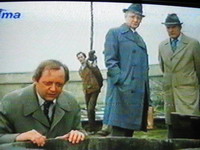 |
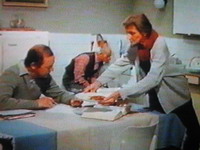 |
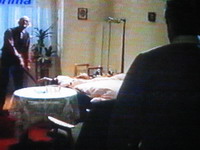 |
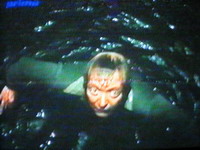 |
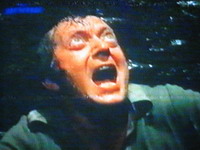 |
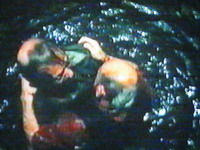 |
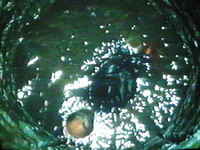 |
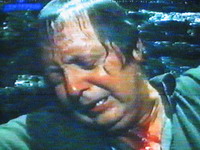 |
|
Good sleep! (And remember that it really happened!)
|
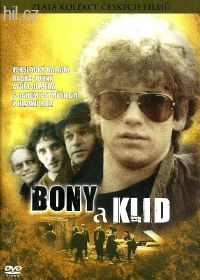 Bony a klid (1987)
Bony a klid (1987)
(Bons and Rest)
Direction: Vít Olmer. Screenplay: Radek John, Vít Olmer. Music: Ondřej Soukup + Frankie Goes to Hollywood. Starring: Jan Potměšil (Martin), Veronika Jeníková (Eva), Josef Nedorost (Robert), Tomáš Hanák (Hary), Roman Skamene (Bíny), Miroslav Kopečný (Bankéř), Vítězslav Jirsák (Martin's father).
The name of the movie is a paraphrase on the famous criminal drama "Bonnie and Clyde" and depicts popular criminal activity of the eighties: traffic with foreign exchanges and the so-called bons, coupons for exclusive foreign goods. A naive boy from Mladá Boleslav comes to Prague, where he wants to exchange crowns for German marks. When he finds out that he was deceived, he wants to find the cheaters and get his money back. However, in the end he joins their gang and enjoys carefree blissful life. But eventually he also learns that this "profession" has lot of risks and everything heads to a tragic end.
Bony a klid is one of the best representants of Czech cinema in the genre of criminal drama and one of the most successful movies of the eighties. Radek John, the author of its screenplay, was a very known journalist, who knew the criminal scene from his own experience. Unfortunately, Jan Potměšil, the performer of the lead role, later suffered a serious wounding and since 1989 has been on an invalid chair. By the way, the movie is effectively filled with songs of the band "Frankie Goes To Hollywood", who were so pleased by the creators' interest in their music that they gave the songs to them for free.
Všichni moji blízcí (1999)
(All My Loved Ones)
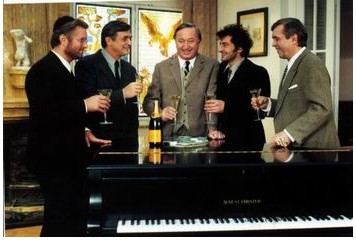 Direction:
Matěj Mináč. Screenplay: Jiří Hubač. Starring: Rupert Graves
(Nicholas Winton), Josef Abrhám (Jakub Silberstein), Libuše Šafránková (Irma,
his wife), Jiří Bartoška (Samuel Silberstein), Marián Labuda (Spitzer), Jiří
Menzel (Stein), Ondřej Vetchý, Jiří Lábus, Ladislav Chudík (members of the family).
Direction:
Matěj Mináč. Screenplay: Jiří Hubač. Starring: Rupert Graves
(Nicholas Winton), Josef Abrhám (Jakub Silberstein), Libuše Šafránková (Irma,
his wife), Jiří Bartoška (Samuel Silberstein), Marián Labuda (Spitzer), Jiří
Menzel (Stein), Ondřej Vetchý, Jiří Lábus, Ladislav Chudík (members of the family).
This movie depicts a story about Nicholas Winton, an almost forgotten man, who saved several hundreds of Czech Jewish children before the beginning of WW II. We watch fates of a fictious family of the Silbersteins, their only son and their relatives in the fatal year 1939. The parents feel that their future in the Hitler's Reich is uncertain and since they can't leave the country, they consider, if they are to accept an offer of young Winton, who plans to transport several hundreds of Jewish children to the Great Britain, where they will be adopted by English parents. The Silbersteins don't want to leave their son alone, but in the end they find out that it will be the only chance for him to survive.
All My Loved Ones is sometimes called "the Czech Schindler's List". It can sound like plagiarism, but in any case it is one of those rare examples when a movie markedly overcame my expectations. I was really surprised, because it is a well-done, impressive drama. By the way, Woody Harrelson saw it twice during his visit at the international film festival in Karlovy Vary. In 2002 Mináč got an Emmy for a documentary movie about Winton and his rescue action. Winton himself was recently honoured by the British Queen.
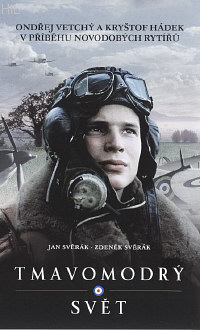 Tmavomodrý svět (2001)
Tmavomodrý svět (2001)
(The Dark Blue World)
Direction: Jan Svěrák. Screenplay: Zdeněk Svěrák. Music: Ondřej Soukup. Starring: Oldřich Vetchý (František Sláma), Kryštof Hádek (Karel Vojtíšek), Tara Fitzgerald (Susan), Charles Dance (Wing Cmdr. Bentley), Oldřich Kaiser (Machatý), Linda Rybová (Hanička), David Novotný (Bedřich Mrtvý), Jaromír Dulava (Kaňka).
A movie depicting the life of Czech war pilots in the Great Britain during World War II. I list it rather because it was the most expensive movie in the history of Czech cinema, not because it would really deserve to be listed here. I think that Svěrák duo chose a very good theme that promised to be interesting even for spectators abroad (like Kolya did). But the way, how it was written and filmed, isn't remarkable. In short, it is a story about two Czech pilots striving after a British woman, who can't decide between them. In the end, destiny decides instead of her. Foreign critics remarked that it contains a lot of cliché, but I think that there are more substantial faults. First, as a whole it's simply boring. Zdeněk Svěrák is a natural author of comedies, not dramas, and here he wanted to create something like a melodrama with cheerful moments. An adventurous attempt, but with little invention. It's sad, but it's obvious that he is already behind the top of his screenwriter's career. Second, the way how action scenes were filmed, is just terrible. The author of music to this film is a respected Czech author of pop hits, but nobody has told him yet that he can't do music to movies (which he has clearly showed several times already). The "action" scene, where the pilots pursuade German airplanes, is simply miserable and embarassing. And it didn't help that Svěrák junior let a whole historical train to be destroyed during an effective air-raid. It allegedly cost one million dollars. Like the whole Kolya. And the whole movie cost six times more. Thanks to Jan's American producer, who believes in his genius.
Although more than 1 million spectators visited this title in Czech movie houses, it was rather thanks to Svěráks' renomée, I think. The movie namely betrays that the work of both Svěrák senior and junior has a declining tendency that can't be covered by fulsome reviews of Czech film critics. On Amazon.com or imdb.com, many positive comments of American spectators can be found, but personally I don't think that this is the right way, where both Svěráks should continue.
See official pages: http://www.tmavomodrysvet.cz/new/index2.htm






